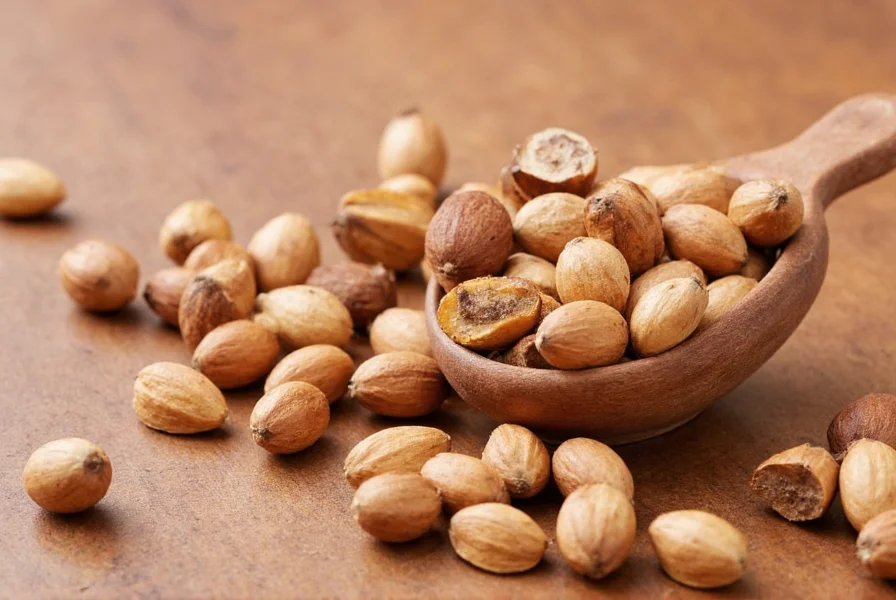Nutmeg (Myristica fragrans), the seed of an evergreen tree native to the Banda Islands in Indonesia, has been prized for centuries not only as a culinary spice but also for its potential health-promoting properties. Modern research continues to validate many traditional uses of this aromatic spice, revealing a complex profile of bioactive compounds that contribute to its therapeutic potential.
Nutritional Profile of Nutmeg
Beyond its distinctive flavor, nutmeg delivers an impressive array of nutrients in modest amounts. A single teaspoon (2 grams) of ground nutmeg contains:
| Nutrient | Amount per Teaspoon | Percentage of Daily Value |
|---|---|---|
| Calories | 12 | 1% |
| Dietary Fiber | 1g | 4% |
| Manganese | 0.2mg | 10% |
| Copper | 0.1mg | 11% |
| Magnesium | 10mg | 3% |
| Potassium | 20mg | 1% |
What makes nutmeg particularly valuable are its bioactive compounds, including myristicin, elemicin, and lignans, which contribute significantly to its health benefits of nutmeg beyond basic nutrition.

Scientifically Supported Health Benefits of Nutmeg
Powerful Anti-Inflammatory Properties
Multiple studies have demonstrated nutmeg's impressive anti-inflammatory effects. Research published in the Journal of Agricultural and Food Chemistry found that nutmeg extract significantly reduced inflammation markers in laboratory tests. The myristicin and other essential oils in nutmeg inhibit inflammatory pathways, potentially helping with conditions like arthritis and other inflammatory disorders. This represents one of the most well-documented benefits of using nutmeg for health purposes.
Digestive Health Support
Nutmeg has been used traditionally across various cultures to support digestive health. Scientific evidence supports these traditional uses, showing that nutmeg can stimulate digestive enzymes and improve gut motility. A 2016 study in Food Science & Nutrition demonstrated that nutmeg extract enhanced gastric emptying and reduced intestinal inflammation in animal models. For those experiencing occasional digestive discomfort, a small amount of nutmeg in warm milk or tea may provide relief without the side effects of pharmaceutical options.
Natural Sleep Aid and Anxiety Reduction
One of the lesser-known benefits of nutmeg consumption is its potential to improve sleep quality and reduce anxiety. Nutmeg contains compounds that interact with neurotransmitters involved in relaxation. A small amount (¼ to ½ teaspoon) of nutmeg in warm milk before bedtime has been shown in preliminary research to promote deeper sleep. However, it's crucial to note that excessive consumption can have the opposite effect due to the psychoactive properties of myristicin at high doses.
Oral Health Benefits of Nutmeg
Nutmeg's antimicrobial properties make it valuable for oral health. Studies have shown that nutmeg extract effectively inhibits the growth of bacteria responsible for dental plaque and gum disease. Many traditional tooth powders include nutmeg for this reason. The spice's natural analgesic properties also help relieve toothaches, making it a valuable component in natural oral care routines.
Pain Relief Properties
Research indicates that nutmeg may help alleviate certain types of pain. The compound myristicin has shown analgesic effects in laboratory studies, potentially helping with headaches and muscle aches. When combined with other anti-inflammatory spices like turmeric, nutmeg may enhance the overall pain-relieving effects of the spice blend.
Important Considerations and Potential Risks
While exploring the health benefits of nutmeg, it's essential to understand the potential risks associated with improper use:
- Appropriate dosage: Therapeutic benefits are typically seen with ¼ to ½ teaspoon daily. Consuming more than 1-2 teaspoons at once can cause adverse effects.
- Toxicity concerns: High doses (5 grams or more) can cause nutmeg poisoning, with symptoms including rapid heartbeat, nausea, dehydration, and hallucinations.
- Pregnancy considerations: Pregnant women should avoid medicinal amounts of nutmeg as it may stimulate uterine contractions.
- Medication interactions: Nutmeg may interact with certain antidepressants and sedatives due to its effects on neurotransmitters.
How to Incorporate Nutmeg for Maximum Benefits
To safely enjoy the benefits of nutmeg in your daily routine:
- Use freshly grated nutmeg whenever possible, as it contains higher levels of volatile oils than pre-ground versions
- Add ¼ teaspoon to warm milk before bedtime for improved sleep
- Sprinkle over roasted vegetables or sweet potatoes for added flavor and nutrition
- Include in homemade spice blends for meat rubs or soups
- Mix with honey as a natural remedy for occasional sore throats

Nutmeg Compared to Other Spices
While many spices offer health benefits, nutmeg stands out for its unique combination of properties. Unlike turmeric (which excels in anti-inflammatory effects) or cinnamon (known for blood sugar regulation), nutmeg offers a distinctive blend of digestive support, sleep enhancement, and pain relief properties. When combined with other spices in what's known as the "spice synergy" effect, nutmeg can enhance the overall health benefits of your culinary creations.
Conclusion
Nutmeg represents a remarkable example of how traditional culinary spices often contain significant therapeutic potential. The scientifically supported benefits of nutmeg—ranging from anti-inflammatory effects to digestive support and improved sleep—make it a valuable addition to a health-conscious kitchen. By understanding both the potential benefits and limitations of nutmeg consumption, you can safely incorporate this ancient spice into your wellness routine. Remember that moderation is key, and when used appropriately, nutmeg can be both a flavorful culinary ingredient and a supportive element of a healthy lifestyle.
Frequently Asked Questions
What is the recommended daily amount of nutmeg for health benefits?
For health benefits without risk of side effects, ¼ to ½ teaspoon of nutmeg per day is generally considered safe for most adults. Consuming more than 1-2 teaspoons at once can cause adverse effects due to the myristicin content. It's important to note that therapeutic benefits are typically seen with consistent moderate use rather than occasional large doses.
Can nutmeg really help with sleep problems?
Yes, small amounts of nutmeg (¼ to ½ teaspoon) in warm milk before bedtime may help improve sleep quality. Nutmeg contains compounds that interact with neurotransmitters involved in relaxation. However, excessive consumption can have the opposite effect and cause restlessness or hallucinations. The sleep benefits of nutmeg are most effective when used consistently in appropriate doses as part of a healthy bedtime routine.
What are the potential side effects of consuming too much nutmeg?
Consuming more than 1-2 teaspoons of nutmeg at once can cause nutmeg poisoning, with symptoms including rapid heartbeat, nausea, dehydration, dizziness, and in severe cases, hallucinations. These effects are primarily due to myristicin, a compound in nutmeg that has psychoactive properties at high doses. Symptoms typically appear 1-8 hours after consumption and can last up to 48 hours. It's crucial to use nutmeg in culinary amounts rather than attempting to use it for recreational purposes.
Is there a difference between whole nutmeg and pre-ground nutmeg for health benefits?
Yes, whole nutmeg generally offers superior health benefits compared to pre-ground versions. Freshly grated nutmeg contains higher levels of volatile oils and antioxidants that degrade over time in pre-ground products. The essential oils responsible for many of nutmeg's therapeutic effects are more potent in freshly grated form. For maximum benefits of nutmeg, purchase whole seeds and use a microplane grater to prepare small amounts as needed, storing the remainder in an airtight container away from light and heat.
Can nutmeg interact with medications?
Yes, nutmeg may interact with certain medications, particularly antidepressants (especially MAO inhibitors) and sedatives. The compounds in nutmeg can enhance the effects of these medications, potentially leading to excessive drowsiness or other adverse reactions. People taking these medications should consult with their healthcare provider before using nutmeg in medicinal amounts. For typical culinary use (small amounts in food), interactions are unlikely, but those using nutmeg for therapeutic purposes should exercise caution.











 浙公网安备
33010002000092号
浙公网安备
33010002000092号 浙B2-20120091-4
浙B2-20120091-4